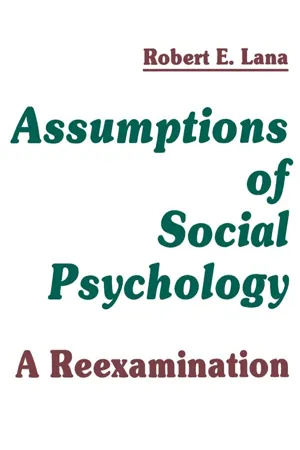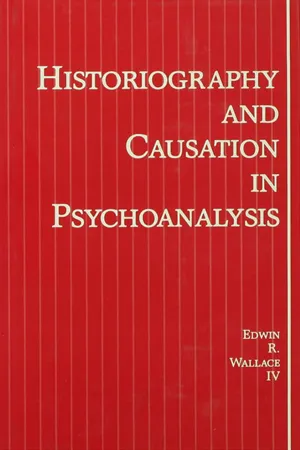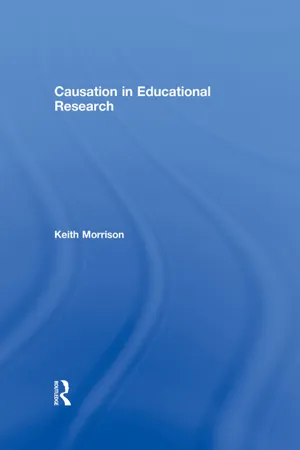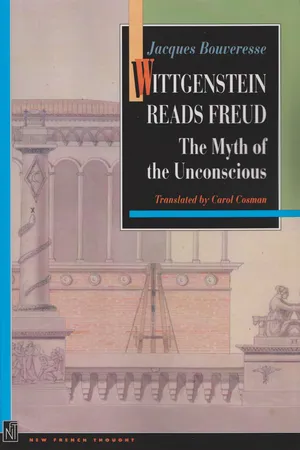Psychology
Causation in Psychology
Causation in psychology refers to the relationship between two variables where one variable influences the other. It is important to establish causation in research to determine the effectiveness of treatments and interventions. However, establishing causation can be difficult due to the presence of confounding variables.
Written by Perlego with AI-assistance
Related key terms
4 Key excerpts on "Causation in Psychology"
- eBook - ePub
Assumptions of Social Psychology
A Reexamination
- Robert E. Lana(Author)
- 2014(Publication Date)
- Psychology Press(Publisher)
CHAPTER 3 CausationOne of the natural derivatives of the Cartesian dichotomy is the separation of causation from intention in the epistemology of modern psychology. For a human event to be caused, and to discover that cause, implies that it is no different from the events in other sciences and that, therefore, the epistemologies of psychology and the natural sciences are the same. If a human event is not caused, one need consider the person as the origin of the event and the individual’s intention regarding that event is of central importance. Consequently, the methods of psychology would be different from the methods of other sciences.In this chapter I discuss the nature of causation as it implicitly or explicitly enters psychological theorizing. Intention is discussed in chapter 4 .CAUSE AND EFFECTDetermining the nature of causation has occupied a number of people for a long time, but there is still no general agreement as to its definition (Tooley, 1987). The concept enters psychological thinking, either implicitly or explicitly, in a way that it does not enter thinking in biology, physics, or chemistry. This is because psychological prediction and explanation require that one take a position on the nature of causation both as a process by which one builds explanation, and as a characteristic mode of responding of human beings who are the builders of explanations of the world around them.Sometimes, as we see here, questions as to the nature of causation are admittedly begged and a kind of causative agnosticism is acknowledged. In other instances, the nature of causation that is assumed in an explanatory system is made clear. In either case, psychologists, social or otherwise, must deal, at some time or other, with the issue. - eBook - ePub
- Edwin R. Wallace, IV(Authors)
- 2013(Publication Date)
- Routledge(Publisher)
The vignette of the previously encountered Ms. X illustrates the purposive, meaningful, and antecedent aspects of causation in human behavior.Ms. X, a first year law student, presented with an inability to study. Frantically, she had been turning to all of her professors for advice, tutorials, and study sessions. Her past history revealed parents who were physically present, but emotionally absent, who never bothered themselves about her school work or early career interests, and who stifled her expressions of affection and other feelings. Consequently, the patient developed a low opinion of herself and a conviction that others would be no more receptive to her needs than were her parents. After a dozen sessions it came to her while jogging, in a flash, that she was actually sabotaging her academic success—and as a surreptitious way of getting attention from the professors and me (whom she also begged for advice). In other words, her study problems were caused by her unconscious desire for attention and her equally unconscious assumption (based on childhood experience) that she must seek this attention indirectly lest she be rejected.The principle of psychic causality asserts that behaviors which follow immediately upon certain events in the environment, and actions or statements which occur in temporal contiguity with one another, are meaningfully and causally connected (often via an unconscious linch pin) to one another. This is the theoretical ground upon which the analyst attends to the sequence of his patient's associations and to the analy-sand's responses to the therapist's interventions. For example:During the early evaluation and therapeutic sessions with Mrs. F, I noticed that every time I broached anything having to do with sexuality she shifted in her chair, averted her eyes, and coughed nervously. She did so, for example, when I questioned her about menarche, masturbation, sexual fantasies, early relations with boys, and her current sexual relationship with her husband. From this I hypothesized that there was a cause-effect relationship between my questions and her agitation. When I knew her better, it became clear that my questions had impinged upon anxiety-laden unconscious conflicts over sexuality, stemming from her origin in a family that was preoccupied, negatively, with sex. - eBook - ePub
- Keith Morrison(Author)
- 2012(Publication Date)
- Routledge(Publisher)
- ‘Where different objects produce the same effect, it must be by means of some quality, which we discover to be common among them’ (ibid.: 1.3.15: 7).
- ‘The difference in the effects of two resembling objects must proceed from that particular, in which they differ’ (ibid.: 1.3.15: 8).
- Causes are known only by inference, conjecture and refutation.
- Causation is often probabilistic rather than absolute and deterministic.
- Some effects may be simultaneous with causes.
- Investigating causation involves identifying necessary and sufficient conditions.
- In studying causation it is useful to identify INUS conditions.
- Causes may vary in their relative strengths.
- The direction of causes may be clear, unclear or hypothesized.
- • There is frequently an asymmetry in the direction of causation.
- It is more fitting to consider a chain of causation rather than a specific nexus of a single cause with a single event.
- There is a danger in isolating and focusing on singular causes separately from other contributing causes, contexts and conditions.
- It is fitting to regard causes as events or processes over time.
- Causal nets, conditions and interactions may provide better accounts of causation than linear determinism.
- It is sometimes unclear what actually constitutes a cause and what constitutes an effect.
- The context and conditions of an event are as important as the trigger of an effect.
- There is need to separate a reason from a cause.
- Some causes may be supervenient on other base factors.
- It is important to decide, in terms of temporality, what are relevant causes and what to include and exclude from studies of causation, e.g. how far back in time one needs to go in establishing causes, how far forward in time to go in establishing effects.
- It is important to decide, in spatial or environmental terms (however defined), how widely, narrowly and deeply to trawl in looking for causes and which to include and exclude, e.g. from the psychological to the social, from the micro to the macro, and to decide the direction and combination of such causes.
- eBook - ePub
Wittgenstein Reads Freud
The Myth of the Unconscious
- Jacques Bouveresse, Carol Cosman, Carol Cosman(Authors)
- 2013(Publication Date)
- Princeton University Press(Publisher)
IV Reasons and CausesPsychology belongs to the ratioide realm, and the multiplicity of its facts is not infinite, as the possibility of psychology as an empirical science teaches. The only things that have boundless diversity are psychic motives, and psychology has nothing to do with these.—ROBERT MUSIL , Skizze der Erkenntnis des Dichters (1918)M OORE REPORTS Wittgenstein as saying that the initial confusion of cause and reason had led to the disciples of Freud making an “abominable mess” (“Wittgenstein’s Lectures in 1930–33,” p. 316). In The Blue Book, Wittgenstein explains his point on the difference Freud is accused of neglecting:The proposition that your action has such and such a cause, is a hypothesis. The hypothesis is well-founded if one has had a number of experiences which, roughly speaking, agree in showing that your action is the regular sequel of certain conditions which we then call causes of the action. In order to know the reason which you had for making a certain statement, for acting in a particular way, etc., no number of agreeing experiences is necessary, and the statement of your reason is not a hypothesis. (p. 15)For event A to be considered the cause of event B, one would have to verify that in a sufficient number of cases events of the A variety are regularly followed by events of the B variety. Of course, an event of the first type could still happen without being followed by an event of the second type. The relation of causation (Verursachung) is therefore hypothetical in a sense that the relation between a reason and the action it explains (Begründung) is not. A reason is characterized by the capacity to be recognized as such by the person whose reason it is, and not on the basis of an inductive inference. Yet Freud either formulates causal hypotheses, and in this case he must try and verify them by methods different from his own; or he proposes and imposes reasons, and the acceptance of a reason has nothing to do with the acceptance of an explanatory hypothesis of the causal type, or for that matter with any hypothesis at all. During the treatment, of course, the psychoanalyst may be led to propose various reasons in a hypothetical way; he may even be convinced rather soon, sometimes well before the end of the process, that he knows the true
Index pages curate the most relevant extracts from our library of academic textbooks. They’ve been created using an in-house natural language model (NLM), each adding context and meaning to key research topics.



